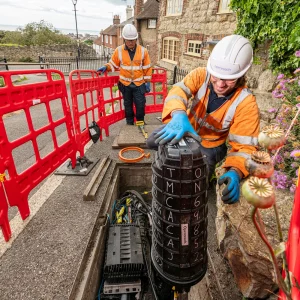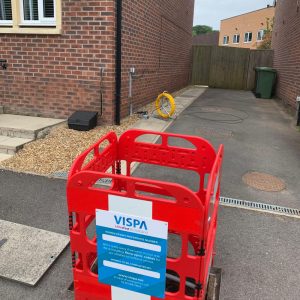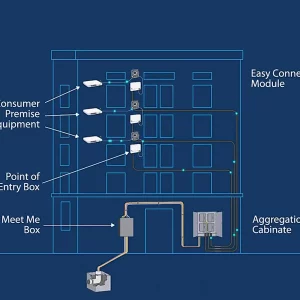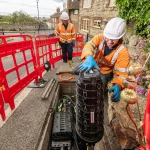Sponsored Links
BT Brings UK Superfast Broadband Rollout Target Forward from 2015 to 2014
Posted: 31st Oct, 2011 By: MarkJ

 The national telecoms operator , BT , has today announced that its £2.5bn plan to rollout superfast broadband ( FTTC , FTTP ) ISP services to 66% of the UK by 2015 has been brought forward by one year to 2014.
The national telecoms operator , BT , has today announced that its £2.5bn plan to rollout superfast broadband ( FTTC , FTTP ) ISP services to 66% of the UK by 2015 has been brought forward by one year to 2014.The effort will require BT to hire an additional 520 telecoms engineers, although many of these will be sourced from ex-armed forces personnel. No "new" money will be required to achieve the enhanced goal, although £300m from BT's existing investment will be brought forward; so far BT has spent nearly £1bn on the project.
Ian Livingstone, BT's CEO, said:
"Our roll-out of fibre broadband is one of the fastest in the world and so it is great to be ahead of what was an already challenging schedule. The acceleration reflects the success of the programme to date and is testament to the hard work and innovation of our people.. We are investing when others are merely talking about it.
Thousands of our engineers are busy installing fibre broadband across the UK at an astonishing pace. The recruitment of an additional five hundred engineers will help us go even faster and ensure we are ready to help supply other areas should we win BDUK funds. We are proud that most of these jobs will be filled by ex-armed forces personnel."
"Our roll-out of fibre broadband is one of the fastest in the world and so it is great to be ahead of what was an already challenging schedule. The acceleration reflects the success of the programme to date and is testament to the hard work and innovation of our people.. We are investing when others are merely talking about it.
Thousands of our engineers are busy installing fibre broadband across the UK at an astonishing pace. The recruitment of an additional five hundred engineers will help us go even faster and ensure we are ready to help supply other areas should we win BDUK funds. We are proud that most of these jobs will be filled by ex-armed forces personnel."
Jeremy Hunt, DCMS Secretary of State, said:
"Superfast broadband is essential for achieving sustainable growth and it is vital that homes and businesses have access to it as soon as possible."
"Superfast broadband is essential for achieving sustainable growth and it is vital that homes and businesses have access to it as soon as possible."
At the time of writing approximately 6 Million UK homes and businesses can already receive the Fibre-to-the-Cabinet ( FTTC ) service ( e.g. BT-Infinity ), which delivers download speeds of up to 40Mbps (rising to 80Mbps next year); this is expected to reach 10 Million in 2012 (40% of the UK).
Some 2.5 Million premises of the total will also be covered by BT's fully fibre optic based Fibre-to-the-Premises ( FTTP ) technology, which will initially deliver speeds of 300Mbps (1000Mbps is possible). FTTC is slower because the fibre optic cable only extends as far as your "local" street cabinet, with the "last mile" of connectivity using existing copper cables. By contrast FTTP takes the higher capacity fibre all the way to your home.
BT also took the opportunity to remind people that it could extend its reach from 66% of the UK to 90% if the government's entire Broadband Delivery UK (BDUK) budget of £530m were handed over. The operator also confirms that such a move would require it to invest a further £1bn of its own money (total £3.5bn). So far no firm decision on who will get what, at the supplier level, has been taken.
Separately BT has also announced a new energy-saving "sleep mode" for broadband connections, which is called Cool Broadband. BT's broadband lines currently eat 0.7% of the UK's total electricity usage and the new solution, which is being piloted at an R&D centre in Suffolk, could cut energy usage down from existing levels by 30%.
Cool Broadband essentially works by capping the top speed of BT's 'up to' 24Mbps ADSL2+ based broadband lines down to just 200Kbps (0.2Mbps) during periods of idle activity and instantly returns to full speed when end-users require more performance.
The move should help BT to slash its energy bills by £13m and cut its carbon footprint to just 5%. Sadly a number of technical problems with the technology have yet to be resolved and a larger trial will be needed before Cool Broadband can be rolled out; that could take years rather than months.
Search ISP News
Search ISP Listings
Search ISP Reviews
Latest UK ISP News








Cheap BIG ISPs for 100Mbps+
150,000+ Customers | View More ISPs
Cheapest ISPs for 100Mbps+
Modest Availability | View More ISPs
Latest UK ISP News
Helpful ISP Guides and Tips
Sponsored Links
The Top 15 Category Tags
- FTTP (6841)
- BT (3898)
- Politics (3090)
- Business (2783)
- Openreach (2677)
- Building Digital UK (2522)
- Mobile Broadband (2493)
- FTTC (2147)
- Statistics (2142)
- 4G (2108)
- Virgin Media (2038)
- Ofcom Regulation (1787)
- 5G (1751)
- Fibre Optic (1607)
- Wireless Internet (1602)
Sponsored
Copyright © 1999 to Present - ISPreview.co.uk - All Rights Reserved - Terms , Privacy and Cookie Policy , Links , Website Rules































